Marketing and Management of Nestle: A Comprehensive Analysis
VerifiedAdded on 2020/04/13
|24
|6398
|419
Report
AI Summary
This report provides a comprehensive analysis of Nestle's marketing management strategies. It delves into various marketing concepts, including the marketing mix (product, price, place, and promotion) and the STP strategy (segmentation, targeting, and positioning). The report examines Nestle's worldwide presence, vision, mission, and core values. It also explores the company's management practices, such as supply chain, total quality management, and human resource management. Furthermore, the report investigates Nestle's sustainability initiatives, including corporate social responsibility and sustainable packaging. The analysis covers legislation in international markets, consumer behavior, and the company's corporate culture, providing a holistic view of Nestle's approach to marketing, management, and sustainability in the food and beverage industry.
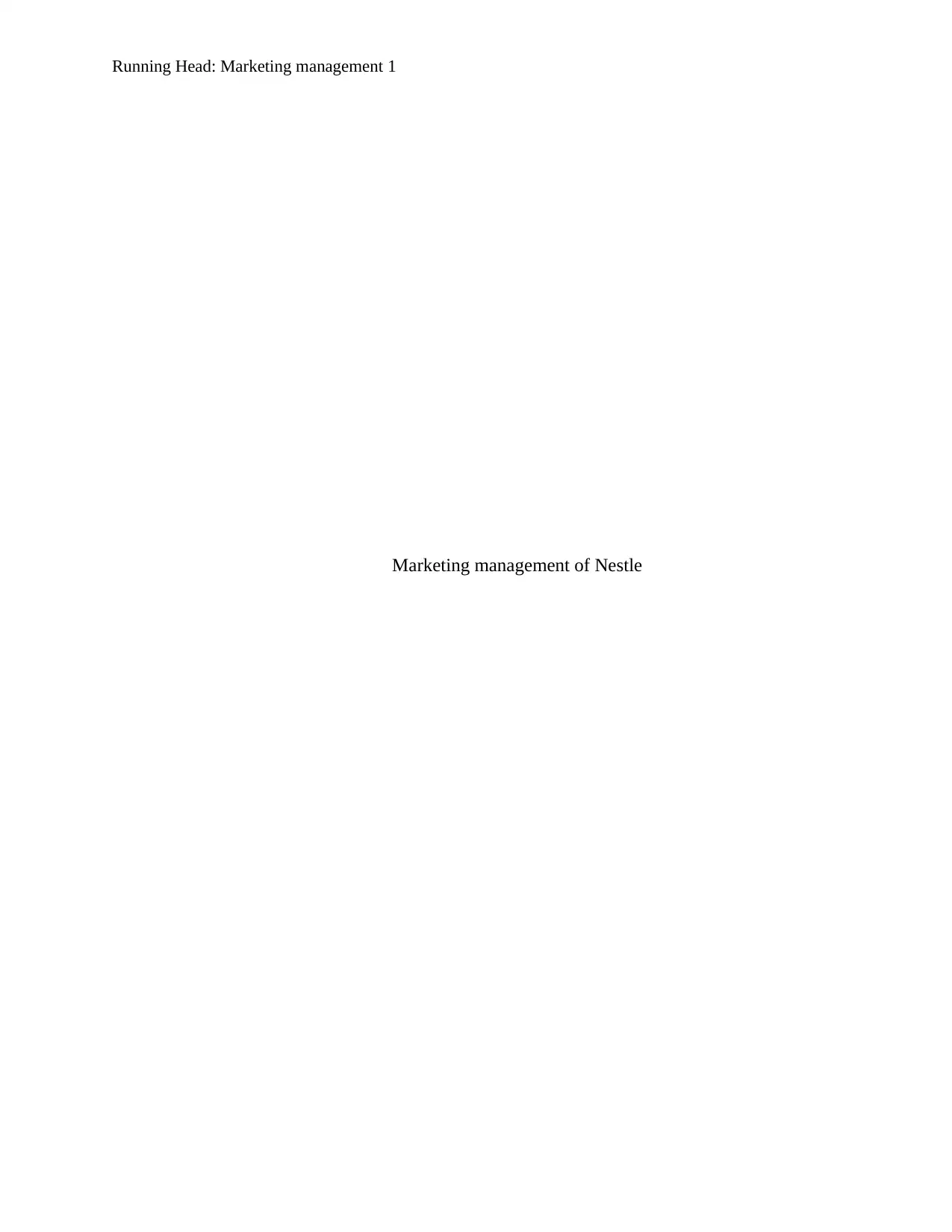
Running Head: Marketing management 1
Marketing management of Nestle
Marketing management of Nestle
Paraphrase This Document
Need a fresh take? Get an instant paraphrase of this document with our AI Paraphraser
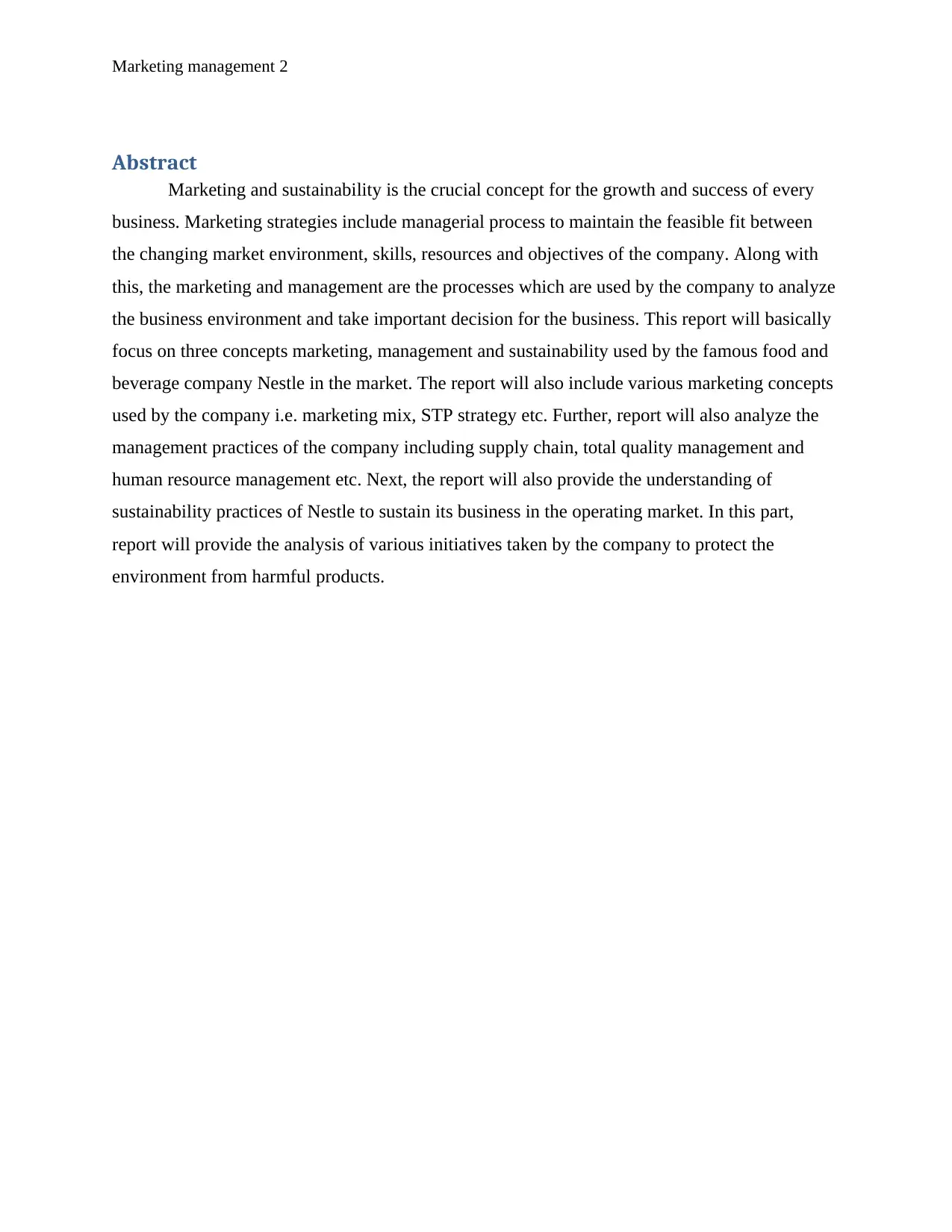
Marketing management 2
Abstract
Marketing and sustainability is the crucial concept for the growth and success of every
business. Marketing strategies include managerial process to maintain the feasible fit between
the changing market environment, skills, resources and objectives of the company. Along with
this, the marketing and management are the processes which are used by the company to analyze
the business environment and take important decision for the business. This report will basically
focus on three concepts marketing, management and sustainability used by the famous food and
beverage company Nestle in the market. The report will also include various marketing concepts
used by the company i.e. marketing mix, STP strategy etc. Further, report will also analyze the
management practices of the company including supply chain, total quality management and
human resource management etc. Next, the report will also provide the understanding of
sustainability practices of Nestle to sustain its business in the operating market. In this part,
report will provide the analysis of various initiatives taken by the company to protect the
environment from harmful products.
Abstract
Marketing and sustainability is the crucial concept for the growth and success of every
business. Marketing strategies include managerial process to maintain the feasible fit between
the changing market environment, skills, resources and objectives of the company. Along with
this, the marketing and management are the processes which are used by the company to analyze
the business environment and take important decision for the business. This report will basically
focus on three concepts marketing, management and sustainability used by the famous food and
beverage company Nestle in the market. The report will also include various marketing concepts
used by the company i.e. marketing mix, STP strategy etc. Further, report will also analyze the
management practices of the company including supply chain, total quality management and
human resource management etc. Next, the report will also provide the understanding of
sustainability practices of Nestle to sustain its business in the operating market. In this part,
report will provide the analysis of various initiatives taken by the company to protect the
environment from harmful products.
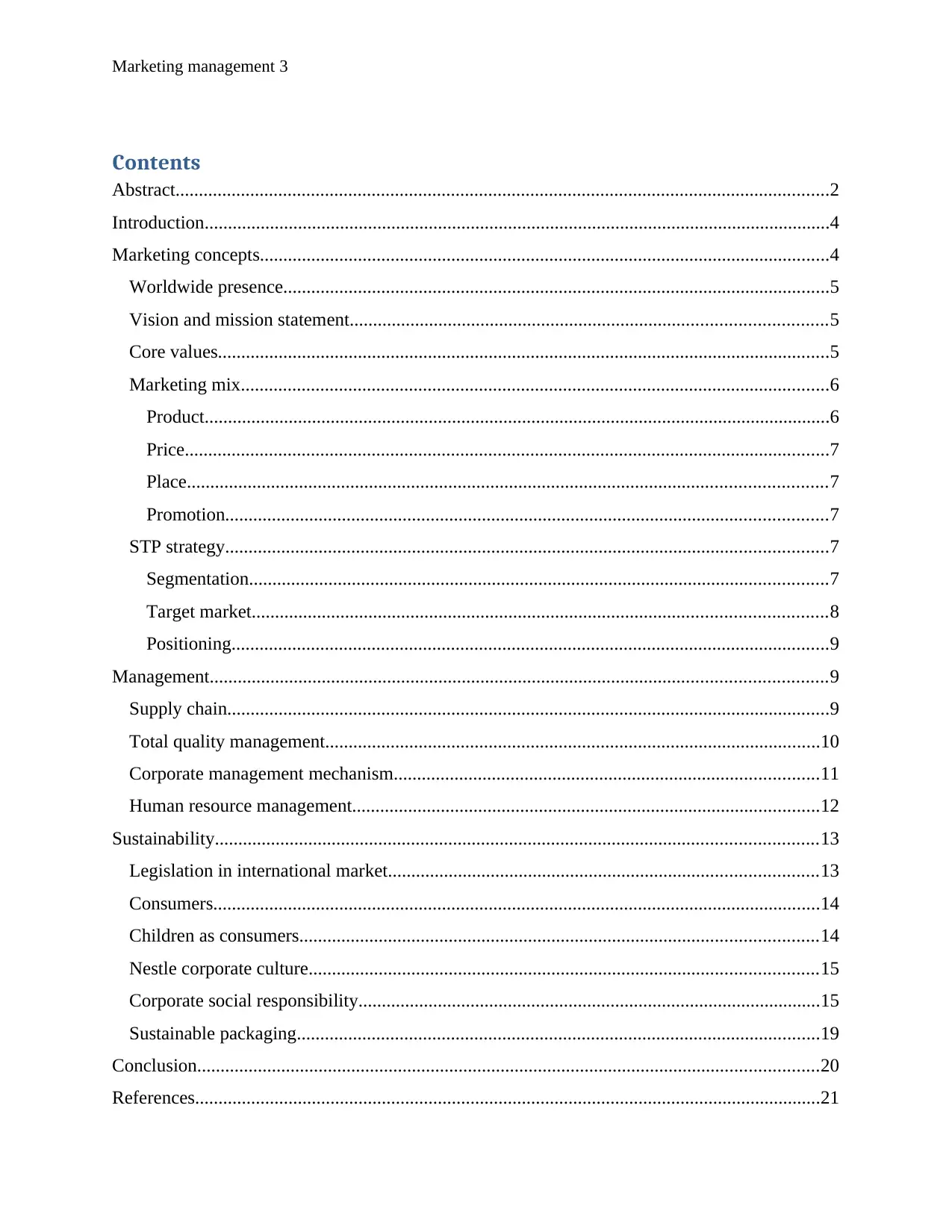
Marketing management 3
Contents
Abstract............................................................................................................................................2
Introduction......................................................................................................................................4
Marketing concepts..........................................................................................................................4
Worldwide presence.....................................................................................................................5
Vision and mission statement......................................................................................................5
Core values...................................................................................................................................5
Marketing mix..............................................................................................................................6
Product......................................................................................................................................6
Price..........................................................................................................................................7
Place.........................................................................................................................................7
Promotion.................................................................................................................................7
STP strategy.................................................................................................................................7
Segmentation............................................................................................................................7
Target market...........................................................................................................................8
Positioning................................................................................................................................9
Management....................................................................................................................................9
Supply chain.................................................................................................................................9
Total quality management..........................................................................................................10
Corporate management mechanism...........................................................................................11
Human resource management....................................................................................................12
Sustainability.................................................................................................................................13
Legislation in international market............................................................................................13
Consumers..................................................................................................................................14
Children as consumers...............................................................................................................14
Nestle corporate culture.............................................................................................................15
Corporate social responsibility...................................................................................................15
Sustainable packaging................................................................................................................19
Conclusion.....................................................................................................................................20
References......................................................................................................................................21
Contents
Abstract............................................................................................................................................2
Introduction......................................................................................................................................4
Marketing concepts..........................................................................................................................4
Worldwide presence.....................................................................................................................5
Vision and mission statement......................................................................................................5
Core values...................................................................................................................................5
Marketing mix..............................................................................................................................6
Product......................................................................................................................................6
Price..........................................................................................................................................7
Place.........................................................................................................................................7
Promotion.................................................................................................................................7
STP strategy.................................................................................................................................7
Segmentation............................................................................................................................7
Target market...........................................................................................................................8
Positioning................................................................................................................................9
Management....................................................................................................................................9
Supply chain.................................................................................................................................9
Total quality management..........................................................................................................10
Corporate management mechanism...........................................................................................11
Human resource management....................................................................................................12
Sustainability.................................................................................................................................13
Legislation in international market............................................................................................13
Consumers..................................................................................................................................14
Children as consumers...............................................................................................................14
Nestle corporate culture.............................................................................................................15
Corporate social responsibility...................................................................................................15
Sustainable packaging................................................................................................................19
Conclusion.....................................................................................................................................20
References......................................................................................................................................21
⊘ This is a preview!⊘
Do you want full access?
Subscribe today to unlock all pages.

Trusted by 1+ million students worldwide

Marketing management 4
List of figures
Figure 1: Supply Chain Process.....................................................................................................10
Figure 2: CSR Practices.................................................................................................................17
List of figures
Figure 1: Supply Chain Process.....................................................................................................10
Figure 2: CSR Practices.................................................................................................................17
Paraphrase This Document
Need a fresh take? Get an instant paraphrase of this document with our AI Paraphraser
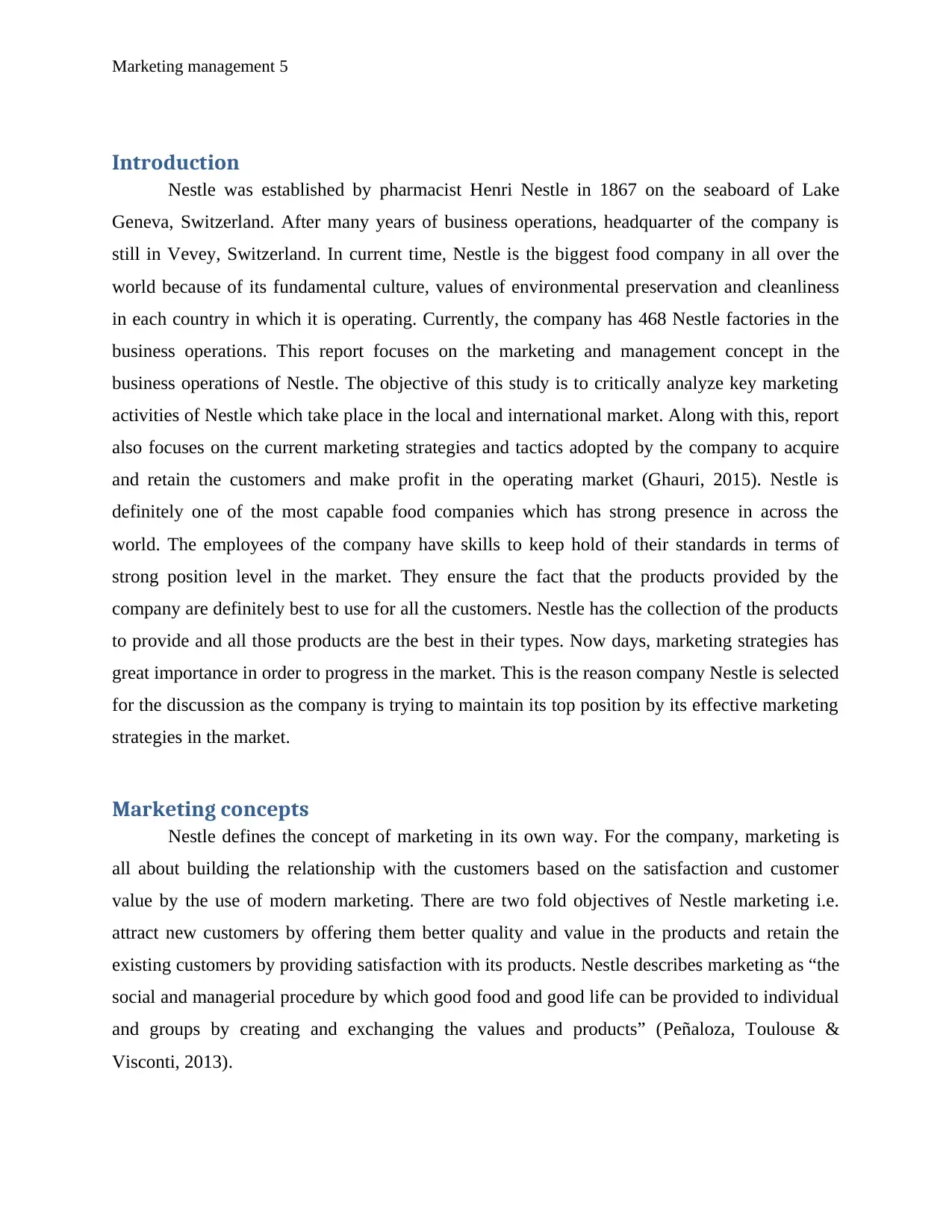
Marketing management 5
Introduction
Nestle was established by pharmacist Henri Nestle in 1867 on the seaboard of Lake
Geneva, Switzerland. After many years of business operations, headquarter of the company is
still in Vevey, Switzerland. In current time, Nestle is the biggest food company in all over the
world because of its fundamental culture, values of environmental preservation and cleanliness
in each country in which it is operating. Currently, the company has 468 Nestle factories in the
business operations. This report focuses on the marketing and management concept in the
business operations of Nestle. The objective of this study is to critically analyze key marketing
activities of Nestle which take place in the local and international market. Along with this, report
also focuses on the current marketing strategies and tactics adopted by the company to acquire
and retain the customers and make profit in the operating market (Ghauri, 2015). Nestle is
definitely one of the most capable food companies which has strong presence in across the
world. The employees of the company have skills to keep hold of their standards in terms of
strong position level in the market. They ensure the fact that the products provided by the
company are definitely best to use for all the customers. Nestle has the collection of the products
to provide and all those products are the best in their types. Now days, marketing strategies has
great importance in order to progress in the market. This is the reason company Nestle is selected
for the discussion as the company is trying to maintain its top position by its effective marketing
strategies in the market.
Marketing concepts
Nestle defines the concept of marketing in its own way. For the company, marketing is
all about building the relationship with the customers based on the satisfaction and customer
value by the use of modern marketing. There are two fold objectives of Nestle marketing i.e.
attract new customers by offering them better quality and value in the products and retain the
existing customers by providing satisfaction with its products. Nestle describes marketing as “the
social and managerial procedure by which good food and good life can be provided to individual
and groups by creating and exchanging the values and products” (Peñaloza, Toulouse &
Visconti, 2013).
Introduction
Nestle was established by pharmacist Henri Nestle in 1867 on the seaboard of Lake
Geneva, Switzerland. After many years of business operations, headquarter of the company is
still in Vevey, Switzerland. In current time, Nestle is the biggest food company in all over the
world because of its fundamental culture, values of environmental preservation and cleanliness
in each country in which it is operating. Currently, the company has 468 Nestle factories in the
business operations. This report focuses on the marketing and management concept in the
business operations of Nestle. The objective of this study is to critically analyze key marketing
activities of Nestle which take place in the local and international market. Along with this, report
also focuses on the current marketing strategies and tactics adopted by the company to acquire
and retain the customers and make profit in the operating market (Ghauri, 2015). Nestle is
definitely one of the most capable food companies which has strong presence in across the
world. The employees of the company have skills to keep hold of their standards in terms of
strong position level in the market. They ensure the fact that the products provided by the
company are definitely best to use for all the customers. Nestle has the collection of the products
to provide and all those products are the best in their types. Now days, marketing strategies has
great importance in order to progress in the market. This is the reason company Nestle is selected
for the discussion as the company is trying to maintain its top position by its effective marketing
strategies in the market.
Marketing concepts
Nestle defines the concept of marketing in its own way. For the company, marketing is
all about building the relationship with the customers based on the satisfaction and customer
value by the use of modern marketing. There are two fold objectives of Nestle marketing i.e.
attract new customers by offering them better quality and value in the products and retain the
existing customers by providing satisfaction with its products. Nestle describes marketing as “the
social and managerial procedure by which good food and good life can be provided to individual
and groups by creating and exchanging the values and products” (Peñaloza, Toulouse &
Visconti, 2013).
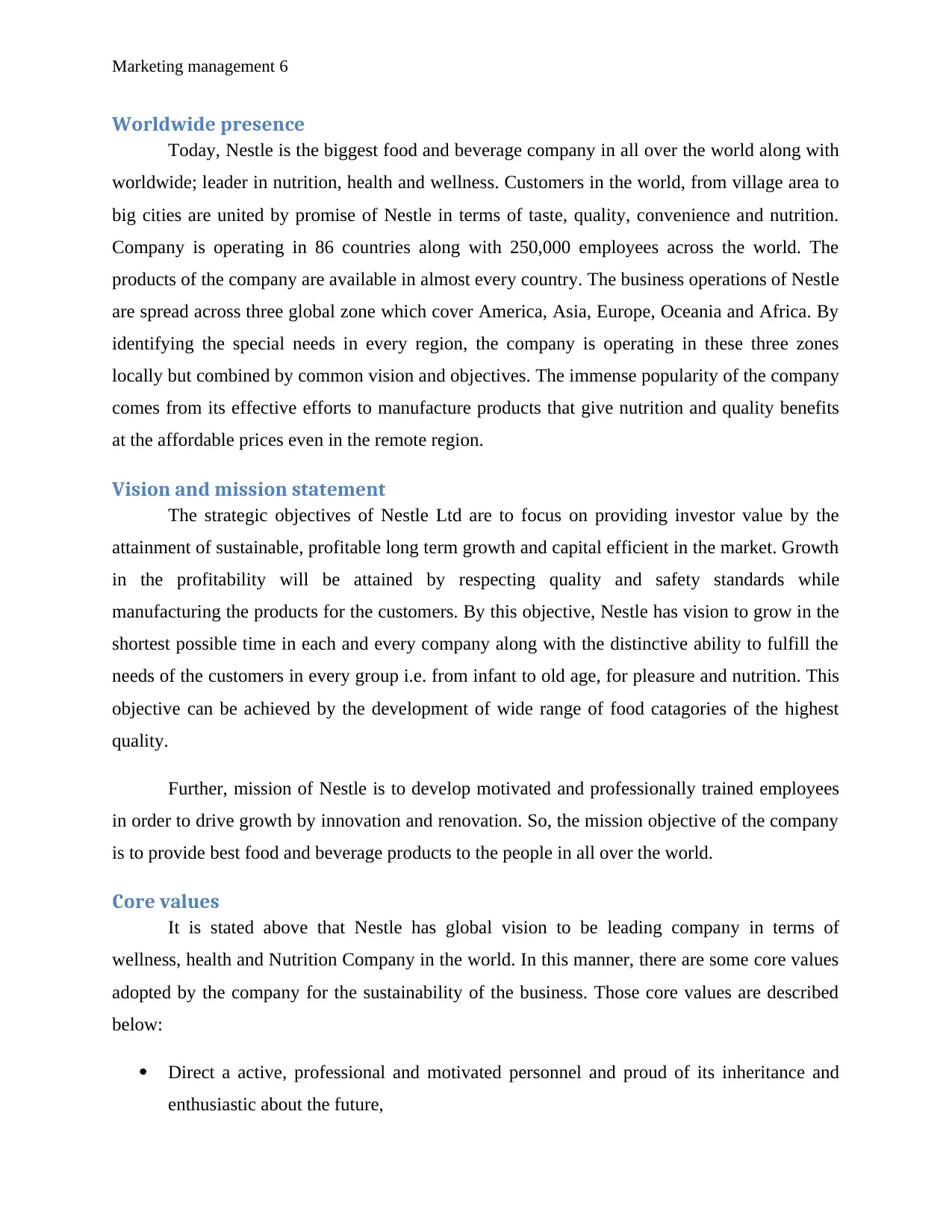
Marketing management 6
Worldwide presence
Today, Nestle is the biggest food and beverage company in all over the world along with
worldwide; leader in nutrition, health and wellness. Customers in the world, from village area to
big cities are united by promise of Nestle in terms of taste, quality, convenience and nutrition.
Company is operating in 86 countries along with 250,000 employees across the world. The
products of the company are available in almost every country. The business operations of Nestle
are spread across three global zone which cover America, Asia, Europe, Oceania and Africa. By
identifying the special needs in every region, the company is operating in these three zones
locally but combined by common vision and objectives. The immense popularity of the company
comes from its effective efforts to manufacture products that give nutrition and quality benefits
at the affordable prices even in the remote region.
Vision and mission statement
The strategic objectives of Nestle Ltd are to focus on providing investor value by the
attainment of sustainable, profitable long term growth and capital efficient in the market. Growth
in the profitability will be attained by respecting quality and safety standards while
manufacturing the products for the customers. By this objective, Nestle has vision to grow in the
shortest possible time in each and every company along with the distinctive ability to fulfill the
needs of the customers in every group i.e. from infant to old age, for pleasure and nutrition. This
objective can be achieved by the development of wide range of food catagories of the highest
quality.
Further, mission of Nestle is to develop motivated and professionally trained employees
in order to drive growth by innovation and renovation. So, the mission objective of the company
is to provide best food and beverage products to the people in all over the world.
Core values
It is stated above that Nestle has global vision to be leading company in terms of
wellness, health and Nutrition Company in the world. In this manner, there are some core values
adopted by the company for the sustainability of the business. Those core values are described
below:
Direct a active, professional and motivated personnel and proud of its inheritance and
enthusiastic about the future,
Worldwide presence
Today, Nestle is the biggest food and beverage company in all over the world along with
worldwide; leader in nutrition, health and wellness. Customers in the world, from village area to
big cities are united by promise of Nestle in terms of taste, quality, convenience and nutrition.
Company is operating in 86 countries along with 250,000 employees across the world. The
products of the company are available in almost every country. The business operations of Nestle
are spread across three global zone which cover America, Asia, Europe, Oceania and Africa. By
identifying the special needs in every region, the company is operating in these three zones
locally but combined by common vision and objectives. The immense popularity of the company
comes from its effective efforts to manufacture products that give nutrition and quality benefits
at the affordable prices even in the remote region.
Vision and mission statement
The strategic objectives of Nestle Ltd are to focus on providing investor value by the
attainment of sustainable, profitable long term growth and capital efficient in the market. Growth
in the profitability will be attained by respecting quality and safety standards while
manufacturing the products for the customers. By this objective, Nestle has vision to grow in the
shortest possible time in each and every company along with the distinctive ability to fulfill the
needs of the customers in every group i.e. from infant to old age, for pleasure and nutrition. This
objective can be achieved by the development of wide range of food catagories of the highest
quality.
Further, mission of Nestle is to develop motivated and professionally trained employees
in order to drive growth by innovation and renovation. So, the mission objective of the company
is to provide best food and beverage products to the people in all over the world.
Core values
It is stated above that Nestle has global vision to be leading company in terms of
wellness, health and Nutrition Company in the world. In this manner, there are some core values
adopted by the company for the sustainability of the business. Those core values are described
below:
Direct a active, professional and motivated personnel and proud of its inheritance and
enthusiastic about the future,
⊘ This is a preview!⊘
Do you want full access?
Subscribe today to unlock all pages.

Trusted by 1+ million students worldwide
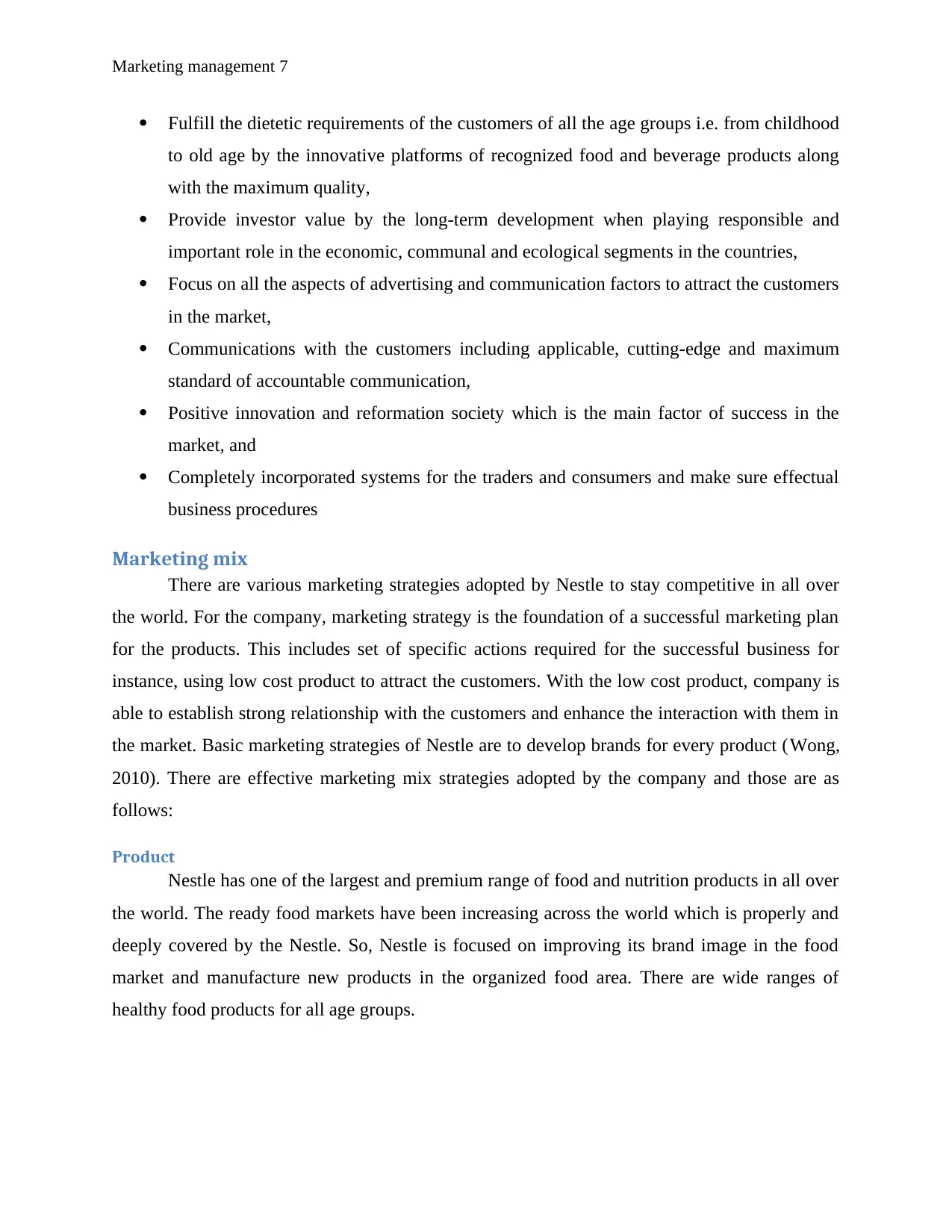
Marketing management 7
Fulfill the dietetic requirements of the customers of all the age groups i.e. from childhood
to old age by the innovative platforms of recognized food and beverage products along
with the maximum quality,
Provide investor value by the long-term development when playing responsible and
important role in the economic, communal and ecological segments in the countries,
Focus on all the aspects of advertising and communication factors to attract the customers
in the market,
Communications with the customers including applicable, cutting-edge and maximum
standard of accountable communication,
Positive innovation and reformation society which is the main factor of success in the
market, and
Completely incorporated systems for the traders and consumers and make sure effectual
business procedures
Marketing mix
There are various marketing strategies adopted by Nestle to stay competitive in all over
the world. For the company, marketing strategy is the foundation of a successful marketing plan
for the products. This includes set of specific actions required for the successful business for
instance, using low cost product to attract the customers. With the low cost product, company is
able to establish strong relationship with the customers and enhance the interaction with them in
the market. Basic marketing strategies of Nestle are to develop brands for every product (Wong,
2010). There are effective marketing mix strategies adopted by the company and those are as
follows:
Product
Nestle has one of the largest and premium range of food and nutrition products in all over
the world. The ready food markets have been increasing across the world which is properly and
deeply covered by the Nestle. So, Nestle is focused on improving its brand image in the food
market and manufacture new products in the organized food area. There are wide ranges of
healthy food products for all age groups.
Fulfill the dietetic requirements of the customers of all the age groups i.e. from childhood
to old age by the innovative platforms of recognized food and beverage products along
with the maximum quality,
Provide investor value by the long-term development when playing responsible and
important role in the economic, communal and ecological segments in the countries,
Focus on all the aspects of advertising and communication factors to attract the customers
in the market,
Communications with the customers including applicable, cutting-edge and maximum
standard of accountable communication,
Positive innovation and reformation society which is the main factor of success in the
market, and
Completely incorporated systems for the traders and consumers and make sure effectual
business procedures
Marketing mix
There are various marketing strategies adopted by Nestle to stay competitive in all over
the world. For the company, marketing strategy is the foundation of a successful marketing plan
for the products. This includes set of specific actions required for the successful business for
instance, using low cost product to attract the customers. With the low cost product, company is
able to establish strong relationship with the customers and enhance the interaction with them in
the market. Basic marketing strategies of Nestle are to develop brands for every product (Wong,
2010). There are effective marketing mix strategies adopted by the company and those are as
follows:
Product
Nestle has one of the largest and premium range of food and nutrition products in all over
the world. The ready food markets have been increasing across the world which is properly and
deeply covered by the Nestle. So, Nestle is focused on improving its brand image in the food
market and manufacture new products in the organized food area. There are wide ranges of
healthy food products for all age groups.
Paraphrase This Document
Need a fresh take? Get an instant paraphrase of this document with our AI Paraphraser
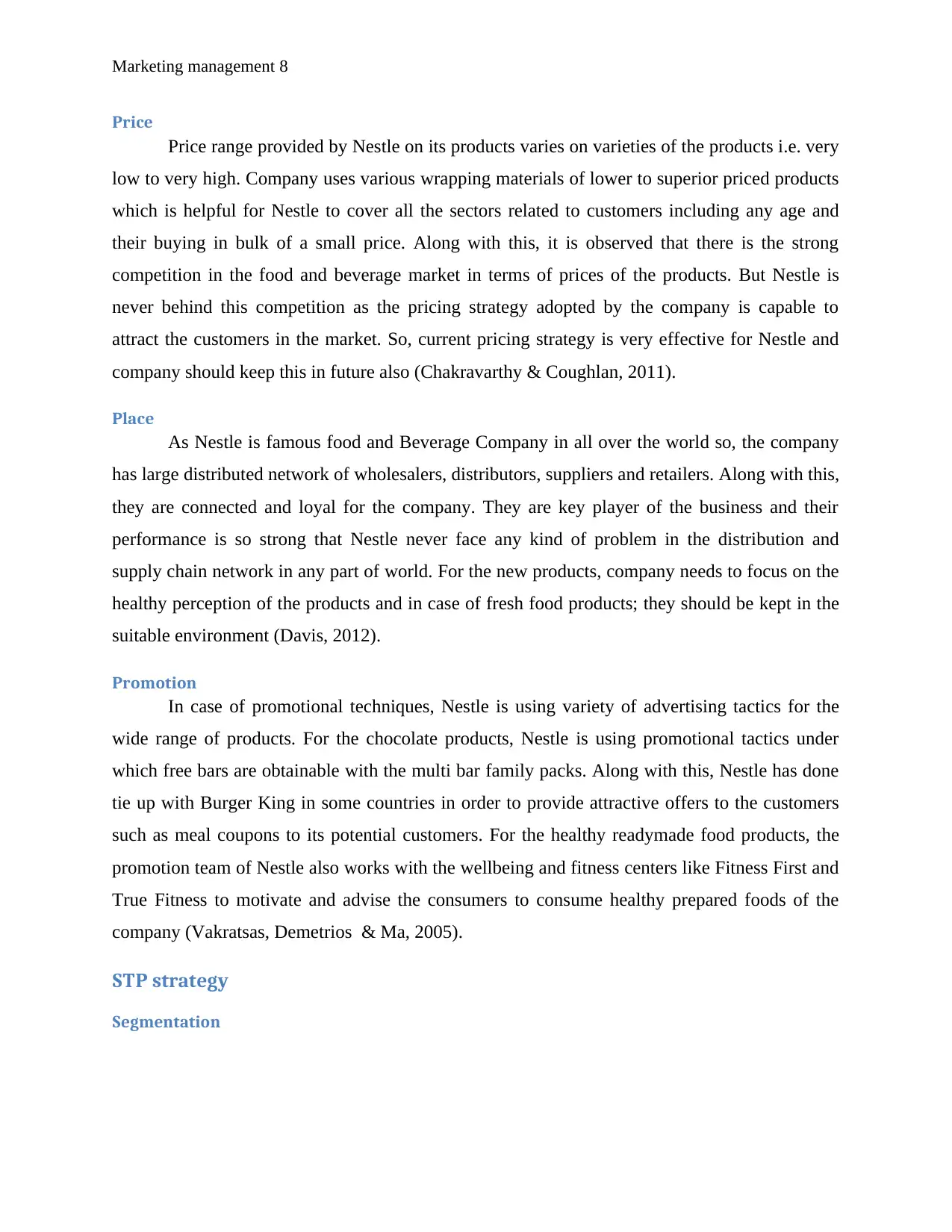
Marketing management 8
Price
Price range provided by Nestle on its products varies on varieties of the products i.e. very
low to very high. Company uses various wrapping materials of lower to superior priced products
which is helpful for Nestle to cover all the sectors related to customers including any age and
their buying in bulk of a small price. Along with this, it is observed that there is the strong
competition in the food and beverage market in terms of prices of the products. But Nestle is
never behind this competition as the pricing strategy adopted by the company is capable to
attract the customers in the market. So, current pricing strategy is very effective for Nestle and
company should keep this in future also (Chakravarthy & Coughlan, 2011).
Place
As Nestle is famous food and Beverage Company in all over the world so, the company
has large distributed network of wholesalers, distributors, suppliers and retailers. Along with this,
they are connected and loyal for the company. They are key player of the business and their
performance is so strong that Nestle never face any kind of problem in the distribution and
supply chain network in any part of world. For the new products, company needs to focus on the
healthy perception of the products and in case of fresh food products; they should be kept in the
suitable environment (Davis, 2012).
Promotion
In case of promotional techniques, Nestle is using variety of advertising tactics for the
wide range of products. For the chocolate products, Nestle is using promotional tactics under
which free bars are obtainable with the multi bar family packs. Along with this, Nestle has done
tie up with Burger King in some countries in order to provide attractive offers to the customers
such as meal coupons to its potential customers. For the healthy readymade food products, the
promotion team of Nestle also works with the wellbeing and fitness centers like Fitness First and
True Fitness to motivate and advise the consumers to consume healthy prepared foods of the
company (Vakratsas, Demetrios & Ma, 2005).
STP strategy
Segmentation
Price
Price range provided by Nestle on its products varies on varieties of the products i.e. very
low to very high. Company uses various wrapping materials of lower to superior priced products
which is helpful for Nestle to cover all the sectors related to customers including any age and
their buying in bulk of a small price. Along with this, it is observed that there is the strong
competition in the food and beverage market in terms of prices of the products. But Nestle is
never behind this competition as the pricing strategy adopted by the company is capable to
attract the customers in the market. So, current pricing strategy is very effective for Nestle and
company should keep this in future also (Chakravarthy & Coughlan, 2011).
Place
As Nestle is famous food and Beverage Company in all over the world so, the company
has large distributed network of wholesalers, distributors, suppliers and retailers. Along with this,
they are connected and loyal for the company. They are key player of the business and their
performance is so strong that Nestle never face any kind of problem in the distribution and
supply chain network in any part of world. For the new products, company needs to focus on the
healthy perception of the products and in case of fresh food products; they should be kept in the
suitable environment (Davis, 2012).
Promotion
In case of promotional techniques, Nestle is using variety of advertising tactics for the
wide range of products. For the chocolate products, Nestle is using promotional tactics under
which free bars are obtainable with the multi bar family packs. Along with this, Nestle has done
tie up with Burger King in some countries in order to provide attractive offers to the customers
such as meal coupons to its potential customers. For the healthy readymade food products, the
promotion team of Nestle also works with the wellbeing and fitness centers like Fitness First and
True Fitness to motivate and advise the consumers to consume healthy prepared foods of the
company (Vakratsas, Demetrios & Ma, 2005).
STP strategy
Segmentation
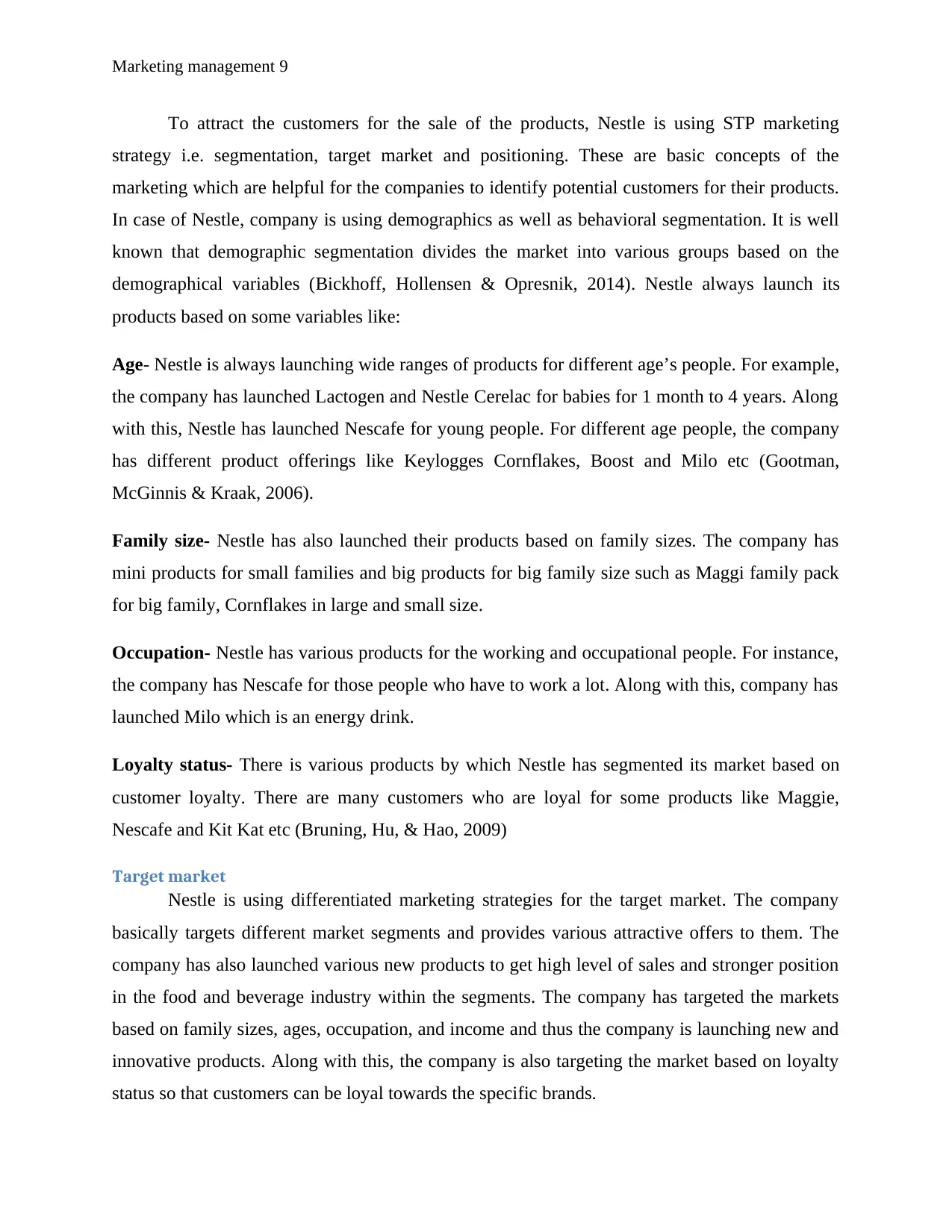
Marketing management 9
To attract the customers for the sale of the products, Nestle is using STP marketing
strategy i.e. segmentation, target market and positioning. These are basic concepts of the
marketing which are helpful for the companies to identify potential customers for their products.
In case of Nestle, company is using demographics as well as behavioral segmentation. It is well
known that demographic segmentation divides the market into various groups based on the
demographical variables (Bickhoff, Hollensen & Opresnik, 2014). Nestle always launch its
products based on some variables like:
Age- Nestle is always launching wide ranges of products for different age’s people. For example,
the company has launched Lactogen and Nestle Cerelac for babies for 1 month to 4 years. Along
with this, Nestle has launched Nescafe for young people. For different age people, the company
has different product offerings like Keylogges Cornflakes, Boost and Milo etc (Gootman,
McGinnis & Kraak, 2006).
Family size- Nestle has also launched their products based on family sizes. The company has
mini products for small families and big products for big family size such as Maggi family pack
for big family, Cornflakes in large and small size.
Occupation- Nestle has various products for the working and occupational people. For instance,
the company has Nescafe for those people who have to work a lot. Along with this, company has
launched Milo which is an energy drink.
Loyalty status- There is various products by which Nestle has segmented its market based on
customer loyalty. There are many customers who are loyal for some products like Maggie,
Nescafe and Kit Kat etc (Bruning, Hu, & Hao, 2009)
Target market
Nestle is using differentiated marketing strategies for the target market. The company
basically targets different market segments and provides various attractive offers to them. The
company has also launched various new products to get high level of sales and stronger position
in the food and beverage industry within the segments. The company has targeted the markets
based on family sizes, ages, occupation, and income and thus the company is launching new and
innovative products. Along with this, the company is also targeting the market based on loyalty
status so that customers can be loyal towards the specific brands.
To attract the customers for the sale of the products, Nestle is using STP marketing
strategy i.e. segmentation, target market and positioning. These are basic concepts of the
marketing which are helpful for the companies to identify potential customers for their products.
In case of Nestle, company is using demographics as well as behavioral segmentation. It is well
known that demographic segmentation divides the market into various groups based on the
demographical variables (Bickhoff, Hollensen & Opresnik, 2014). Nestle always launch its
products based on some variables like:
Age- Nestle is always launching wide ranges of products for different age’s people. For example,
the company has launched Lactogen and Nestle Cerelac for babies for 1 month to 4 years. Along
with this, Nestle has launched Nescafe for young people. For different age people, the company
has different product offerings like Keylogges Cornflakes, Boost and Milo etc (Gootman,
McGinnis & Kraak, 2006).
Family size- Nestle has also launched their products based on family sizes. The company has
mini products for small families and big products for big family size such as Maggi family pack
for big family, Cornflakes in large and small size.
Occupation- Nestle has various products for the working and occupational people. For instance,
the company has Nescafe for those people who have to work a lot. Along with this, company has
launched Milo which is an energy drink.
Loyalty status- There is various products by which Nestle has segmented its market based on
customer loyalty. There are many customers who are loyal for some products like Maggie,
Nescafe and Kit Kat etc (Bruning, Hu, & Hao, 2009)
Target market
Nestle is using differentiated marketing strategies for the target market. The company
basically targets different market segments and provides various attractive offers to them. The
company has also launched various new products to get high level of sales and stronger position
in the food and beverage industry within the segments. The company has targeted the markets
based on family sizes, ages, occupation, and income and thus the company is launching new and
innovative products. Along with this, the company is also targeting the market based on loyalty
status so that customers can be loyal towards the specific brands.
⊘ This is a preview!⊘
Do you want full access?
Subscribe today to unlock all pages.

Trusted by 1+ million students worldwide
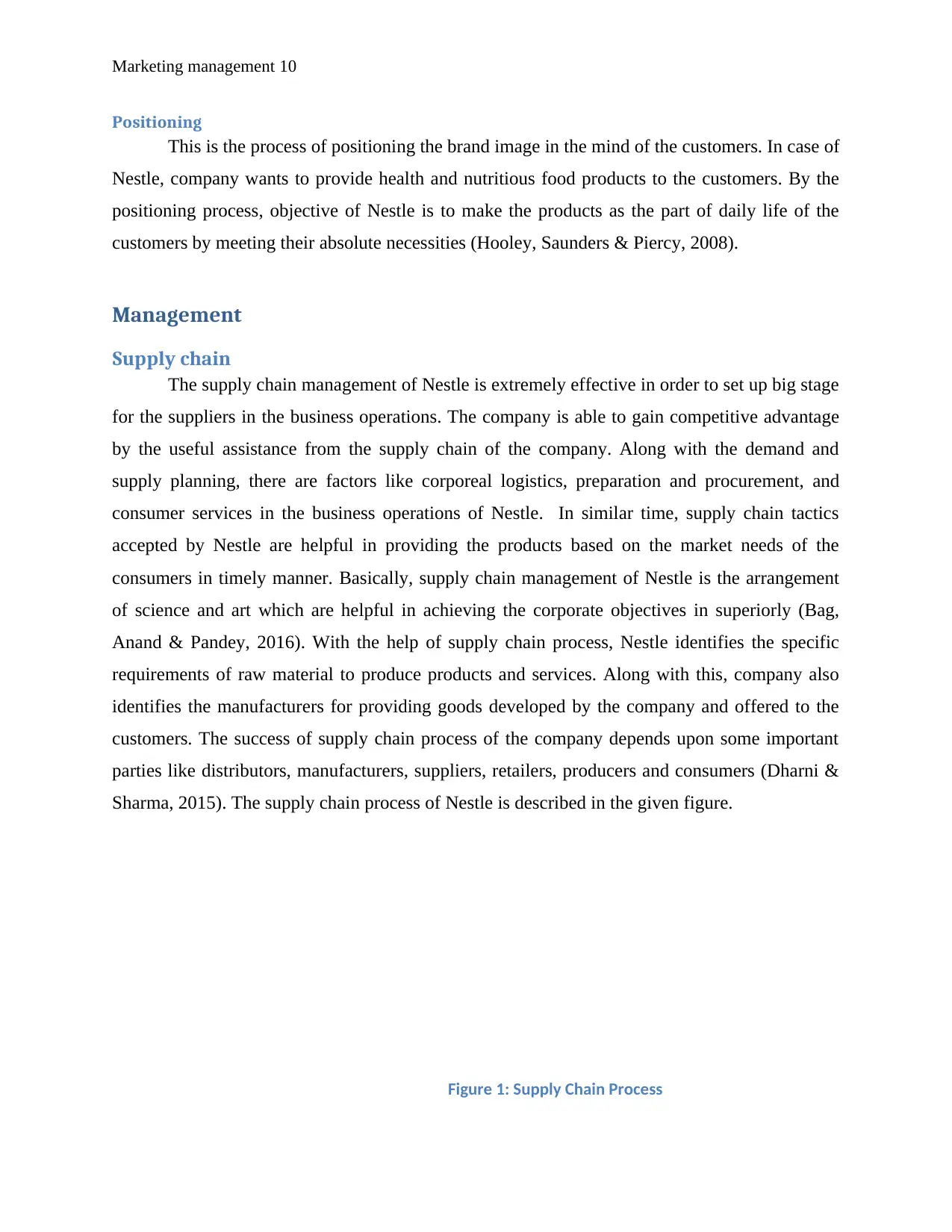
Marketing management 10
Positioning
This is the process of positioning the brand image in the mind of the customers. In case of
Nestle, company wants to provide health and nutritious food products to the customers. By the
positioning process, objective of Nestle is to make the products as the part of daily life of the
customers by meeting their absolute necessities (Hooley, Saunders & Piercy, 2008).
Management
Supply chain
The supply chain management of Nestle is extremely effective in order to set up big stage
for the suppliers in the business operations. The company is able to gain competitive advantage
by the useful assistance from the supply chain of the company. Along with the demand and
supply planning, there are factors like corporeal logistics, preparation and procurement, and
consumer services in the business operations of Nestle. In similar time, supply chain tactics
accepted by Nestle are helpful in providing the products based on the market needs of the
consumers in timely manner. Basically, supply chain management of Nestle is the arrangement
of science and art which are helpful in achieving the corporate objectives in superiorly (Bag,
Anand & Pandey, 2016). With the help of supply chain process, Nestle identifies the specific
requirements of raw material to produce products and services. Along with this, company also
identifies the manufacturers for providing goods developed by the company and offered to the
customers. The success of supply chain process of the company depends upon some important
parties like distributors, manufacturers, suppliers, retailers, producers and consumers (Dharni &
Sharma, 2015). The supply chain process of Nestle is described in the given figure.
Figure 1: Supply Chain Process
Positioning
This is the process of positioning the brand image in the mind of the customers. In case of
Nestle, company wants to provide health and nutritious food products to the customers. By the
positioning process, objective of Nestle is to make the products as the part of daily life of the
customers by meeting their absolute necessities (Hooley, Saunders & Piercy, 2008).
Management
Supply chain
The supply chain management of Nestle is extremely effective in order to set up big stage
for the suppliers in the business operations. The company is able to gain competitive advantage
by the useful assistance from the supply chain of the company. Along with the demand and
supply planning, there are factors like corporeal logistics, preparation and procurement, and
consumer services in the business operations of Nestle. In similar time, supply chain tactics
accepted by Nestle are helpful in providing the products based on the market needs of the
consumers in timely manner. Basically, supply chain management of Nestle is the arrangement
of science and art which are helpful in achieving the corporate objectives in superiorly (Bag,
Anand & Pandey, 2016). With the help of supply chain process, Nestle identifies the specific
requirements of raw material to produce products and services. Along with this, company also
identifies the manufacturers for providing goods developed by the company and offered to the
customers. The success of supply chain process of the company depends upon some important
parties like distributors, manufacturers, suppliers, retailers, producers and consumers (Dharni &
Sharma, 2015). The supply chain process of Nestle is described in the given figure.
Figure 1: Supply Chain Process
Paraphrase This Document
Need a fresh take? Get an instant paraphrase of this document with our AI Paraphraser
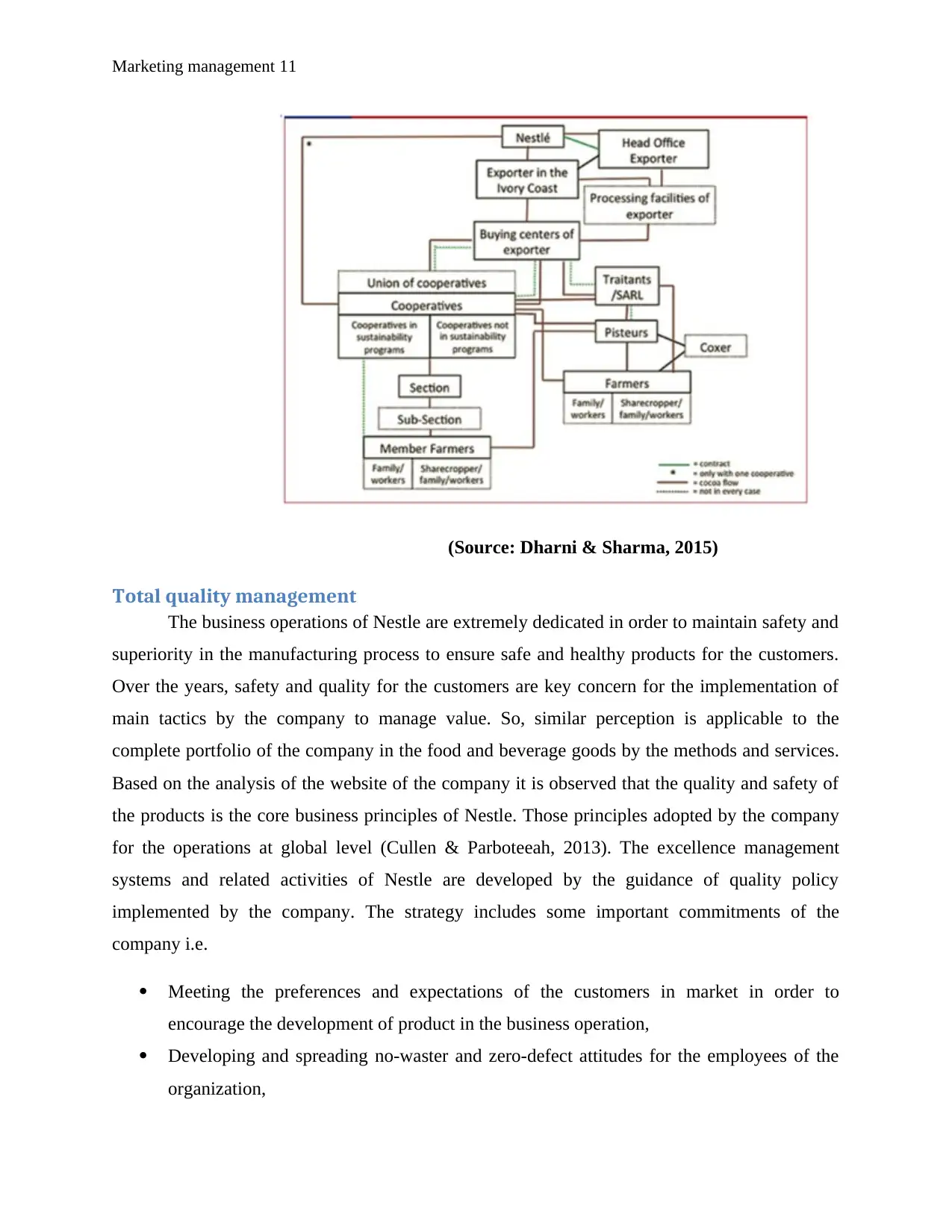
Marketing management 11
(Source: Dharni & Sharma, 2015)
Total quality management
The business operations of Nestle are extremely dedicated in order to maintain safety and
superiority in the manufacturing process to ensure safe and healthy products for the customers.
Over the years, safety and quality for the customers are key concern for the implementation of
main tactics by the company to manage value. So, similar perception is applicable to the
complete portfolio of the company in the food and beverage goods by the methods and services.
Based on the analysis of the website of the company it is observed that the quality and safety of
the products is the core business principles of Nestle. Those principles adopted by the company
for the operations at global level (Cullen & Parboteeah, 2013). The excellence management
systems and related activities of Nestle are developed by the guidance of quality policy
implemented by the company. The strategy includes some important commitments of the
company i.e.
Meeting the preferences and expectations of the customers in market in order to
encourage the development of product in the business operation,
Developing and spreading no-waster and zero-defect attitudes for the employees of the
organization,
(Source: Dharni & Sharma, 2015)
Total quality management
The business operations of Nestle are extremely dedicated in order to maintain safety and
superiority in the manufacturing process to ensure safe and healthy products for the customers.
Over the years, safety and quality for the customers are key concern for the implementation of
main tactics by the company to manage value. So, similar perception is applicable to the
complete portfolio of the company in the food and beverage goods by the methods and services.
Based on the analysis of the website of the company it is observed that the quality and safety of
the products is the core business principles of Nestle. Those principles adopted by the company
for the operations at global level (Cullen & Parboteeah, 2013). The excellence management
systems and related activities of Nestle are developed by the guidance of quality policy
implemented by the company. The strategy includes some important commitments of the
company i.e.
Meeting the preferences and expectations of the customers in market in order to
encourage the development of product in the business operation,
Developing and spreading no-waster and zero-defect attitudes for the employees of the
organization,
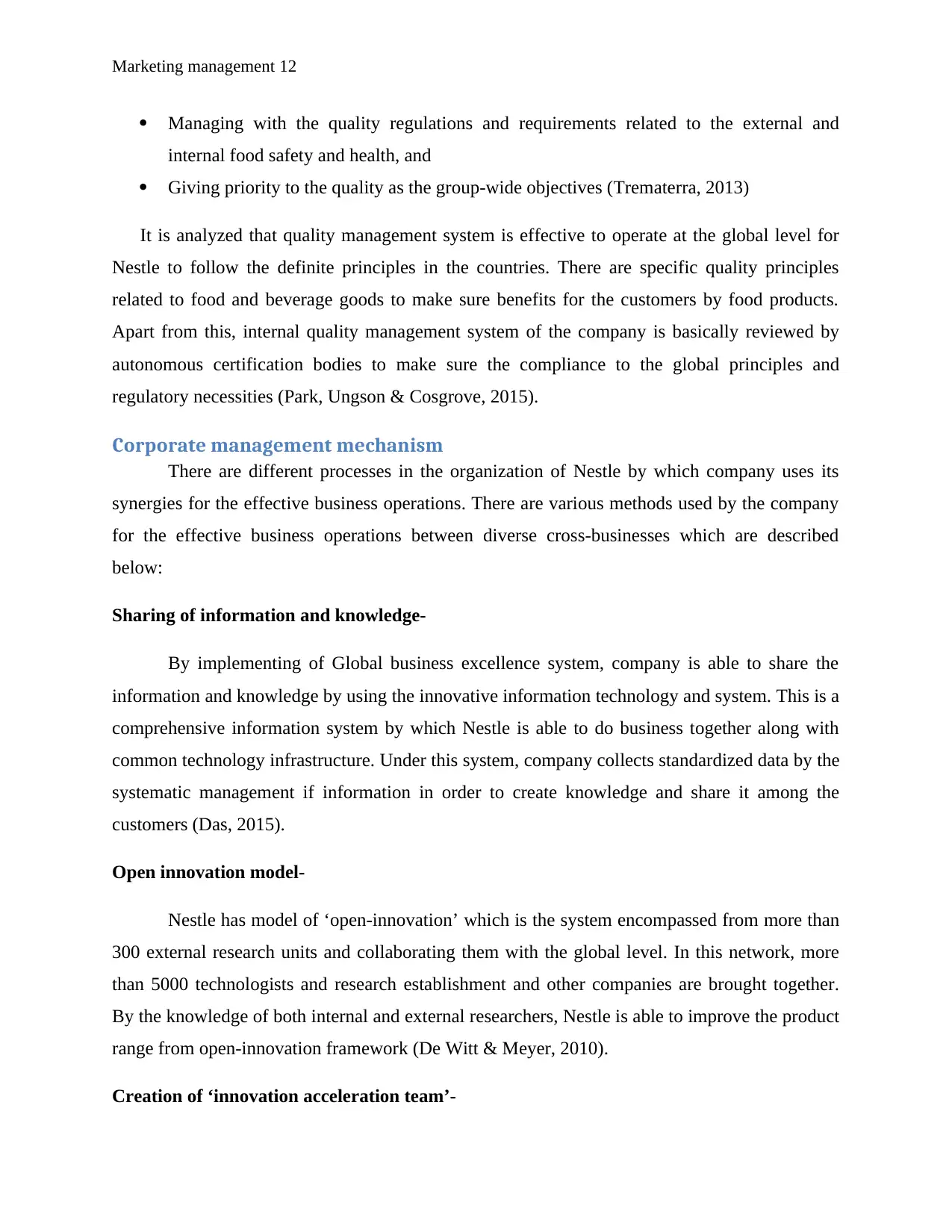
Marketing management 12
Managing with the quality regulations and requirements related to the external and
internal food safety and health, and
Giving priority to the quality as the group-wide objectives (Trematerra, 2013)
It is analyzed that quality management system is effective to operate at the global level for
Nestle to follow the definite principles in the countries. There are specific quality principles
related to food and beverage goods to make sure benefits for the customers by food products.
Apart from this, internal quality management system of the company is basically reviewed by
autonomous certification bodies to make sure the compliance to the global principles and
regulatory necessities (Park, Ungson & Cosgrove, 2015).
Corporate management mechanism
There are different processes in the organization of Nestle by which company uses its
synergies for the effective business operations. There are various methods used by the company
for the effective business operations between diverse cross-businesses which are described
below:
Sharing of information and knowledge-
By implementing of Global business excellence system, company is able to share the
information and knowledge by using the innovative information technology and system. This is a
comprehensive information system by which Nestle is able to do business together along with
common technology infrastructure. Under this system, company collects standardized data by the
systematic management if information in order to create knowledge and share it among the
customers (Das, 2015).
Open innovation model-
Nestle has model of ‘open-innovation’ which is the system encompassed from more than
300 external research units and collaborating them with the global level. In this network, more
than 5000 technologists and research establishment and other companies are brought together.
By the knowledge of both internal and external researchers, Nestle is able to improve the product
range from open-innovation framework (De Witt & Meyer, 2010).
Creation of ‘innovation acceleration team’-
Managing with the quality regulations and requirements related to the external and
internal food safety and health, and
Giving priority to the quality as the group-wide objectives (Trematerra, 2013)
It is analyzed that quality management system is effective to operate at the global level for
Nestle to follow the definite principles in the countries. There are specific quality principles
related to food and beverage goods to make sure benefits for the customers by food products.
Apart from this, internal quality management system of the company is basically reviewed by
autonomous certification bodies to make sure the compliance to the global principles and
regulatory necessities (Park, Ungson & Cosgrove, 2015).
Corporate management mechanism
There are different processes in the organization of Nestle by which company uses its
synergies for the effective business operations. There are various methods used by the company
for the effective business operations between diverse cross-businesses which are described
below:
Sharing of information and knowledge-
By implementing of Global business excellence system, company is able to share the
information and knowledge by using the innovative information technology and system. This is a
comprehensive information system by which Nestle is able to do business together along with
common technology infrastructure. Under this system, company collects standardized data by the
systematic management if information in order to create knowledge and share it among the
customers (Das, 2015).
Open innovation model-
Nestle has model of ‘open-innovation’ which is the system encompassed from more than
300 external research units and collaborating them with the global level. In this network, more
than 5000 technologists and research establishment and other companies are brought together.
By the knowledge of both internal and external researchers, Nestle is able to improve the product
range from open-innovation framework (De Witt & Meyer, 2010).
Creation of ‘innovation acceleration team’-
⊘ This is a preview!⊘
Do you want full access?
Subscribe today to unlock all pages.

Trusted by 1+ million students worldwide
1 out of 24
Related Documents
Your All-in-One AI-Powered Toolkit for Academic Success.
+13062052269
info@desklib.com
Available 24*7 on WhatsApp / Email
![[object Object]](/_next/static/media/star-bottom.7253800d.svg)
Unlock your academic potential
Copyright © 2020–2026 A2Z Services. All Rights Reserved. Developed and managed by ZUCOL.





